Australia is a great place for businesses looking to trade internationally. It has a good location and lots of resources. This makes it easy to trade with the world.
This article will look at why import and export are important in Australia. We’ll explore the economy, trade rules, and the chances for businesses to enter global markets.
Understanding Australia’s Economic Landscape

The Australia economy is strong and growing fast. It has many sectors like mining, agriculture, and services. These help the country’s GDP and make it competitive globally.
Economic stability is key for Australia’s finances. The Australian dollar affects trade and the economy. A good trade balance shows a strong export sector, helping growth and investment.
Statistics from the Australian Bureau of Statistics and the World Bank highlight the need for economic stability. It’s crucial for businesses to understand this. It helps them succeed in international trade.
The Importance of Import and Export for Australia’s Economy
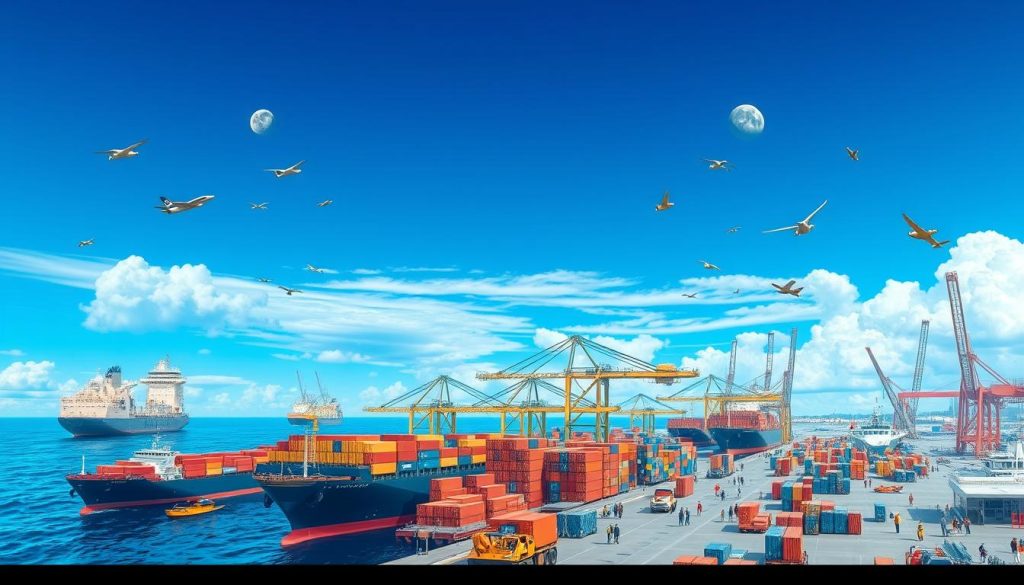
Trade is key to Australia’s economy, with imports and exports playing a big role. The export market is growing, bringing in a lot of money. This helps many industries grow and thrive.
Australia’s economy is diverse and strong, thanks to its exports. For example, agriculture is a big player, with beef, wine, and dairy in demand worldwide. The mining sector also does well, exporting iron ore and coal to meet other countries’ energy needs.
But, some Australian industries rely a lot on imports. This can be risky if global supply chains break down. It’s important to understand this to see how healthy the economy is. Investing in local skills can help make the economy stronger.
In short, trade is vital for Australia’s economy. A strong export market and careful handling of imports are crucial. This balance helps the country stay competitive, innovative, and stable for the future.
Import and Export Business Opportunities in Australia

Australia’s economy is diverse, offering many chances in trade, especially in imports and exports. It’s key to find out which industries are most important for this sector. This is crucial for businesses wanting to succeed worldwide.
Identifying Key Industries for Trade
Several sectors are particularly promising for growth in trade. The most notable include:
- Agriculture: Known for its high-quality Australian products such as wine, dairy, and beef.
- Mining: A major contributor with commodities like iron ore and coal, which have strong demand in various countries.
- Manufacturing: Incorporating advanced technologies, this industry produces goods for both domestic and international markets.
- Technology: An emerging player focusing on software and services that cater to international clientele.
Potential Markets for Exporting Australian Products
When looking at export markets, Australia has many options. Key regions include:
- China: A critical partner for Australian commodities, particularly in agriculture and mining.
- The United States: A lucrative market for manufactured goods and high-demand Australian products.
- Southeast Asia: This region is rapidly growing, presenting opportunities for various sectors, especially agriculture.
Doing a detailed market analysis for these areas is vital. It helps understand cultural factors and how to enter the market successfully.
Navigating Australia’s Trade Regulations
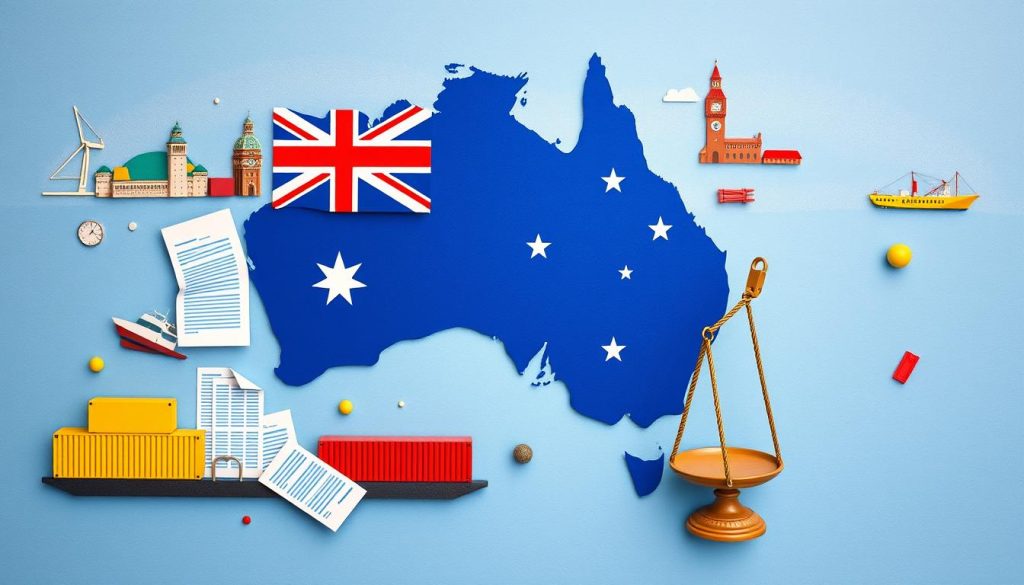
Doing business in Australia means knowing the trade rules well. It’s key for companies to follow these rules to stay legal and successful. The Australian Customs and Border Protection Service helps make sure everyone follows the rules.
Getting the right permits and licences is very important. Companies need to know what’s needed for their products. This can include things like customs clearance, safety, and health rules.
Australia has free trade agreements with other countries. These deals can make trade easier and clearer. It’s important for businesses to understand these agreements to grow their trade.
For businesses to do well in Australia, they should work with customs brokers and legal experts. They can help with the complex rules of trade. This way, companies can avoid big fines and run smoothly in Australia’s busy trade scene.
Benefits of Engaging in the Import and Export Sector
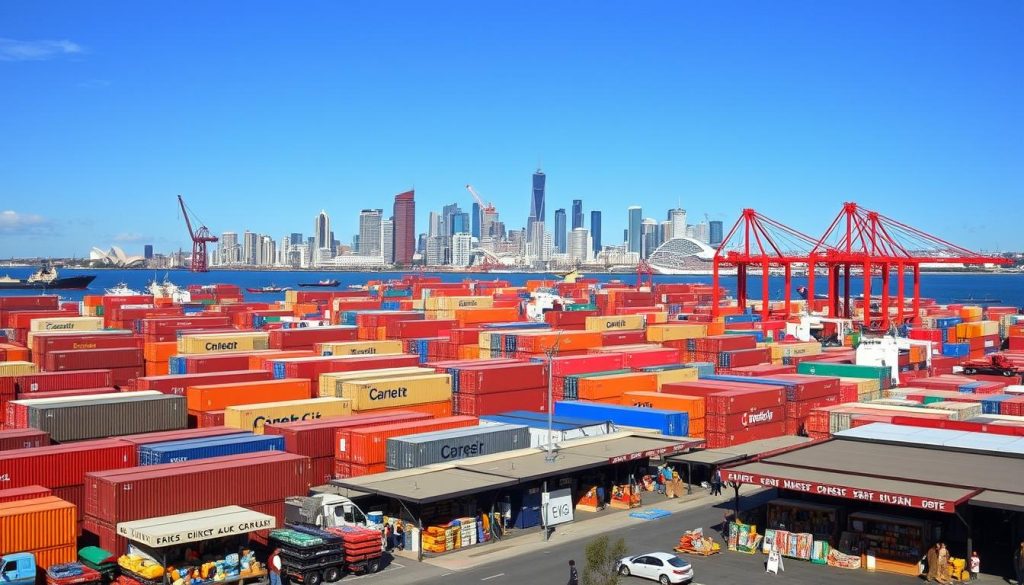
Getting involved in the import and export sector has many benefits for businesses. It opens doors to new markets and helps businesses grow. This can make a big difference in sales and how well a business does.
Access to International Markets
Entering international markets can really help businesses grow. It makes your brand known to more people and can increase sales. By reaching out to new markets, businesses can grow and make lasting connections worldwide.
Expansion of Customer Base
Exporting helps businesses reach more customers. This means more chances to make money. It also helps avoid relying too much on one market, making things more stable.
Economic Diversification Strategies
Diversifying is key for business stability. Trading internationally helps businesses avoid local economic problems. By selling different products in different places, businesses can stay strong even when times are tough.
Challenges Faced in the Import and Export Business

The import and export sector faces many hurdles. These can affect how profitable and efficient a business is. Companies must understand tariffs and duties well. They also need to manage their supply chains effectively.
Understanding Tariffs and Duties
Tariffs and duties are big challenges for import and export businesses. They can make products more expensive. Knowing about tariffs and their impact on profits is key for staying competitive.
Businesses should research tariffs and find ways to reduce costs. This helps them stay competitive in global markets.
Logistical Issues and Supply Chain Management
Logistical problems often happen in import and export. Issues like transportation delays and customs hold-ups can slow things down. It’s crucial for businesses to have good supply chain management.
They should focus on efficient transport and use technology to improve the supply chain. This makes the process smoother and more transparent.
Exploring the Role of Technology in Trade

Technology has changed the way import and export businesses work in Australia. E-commerce has made transactions smooth and reached more markets. Digital platforms help show products worldwide, overcoming old limits of where you could sell.
New payment systems have made trade faster and safer. This means quicker sales across borders. Data analytics also helps understand what customers want, making products better and keeping customers happy.
In a global market that’s getting tougher, Australian businesses need to use technology to stay ahead. It’s not just a choice; it’s a must for success. The fast-changing digital world means businesses must stay quick and use tech to improve how they work.
Export and Import Strategies for Success
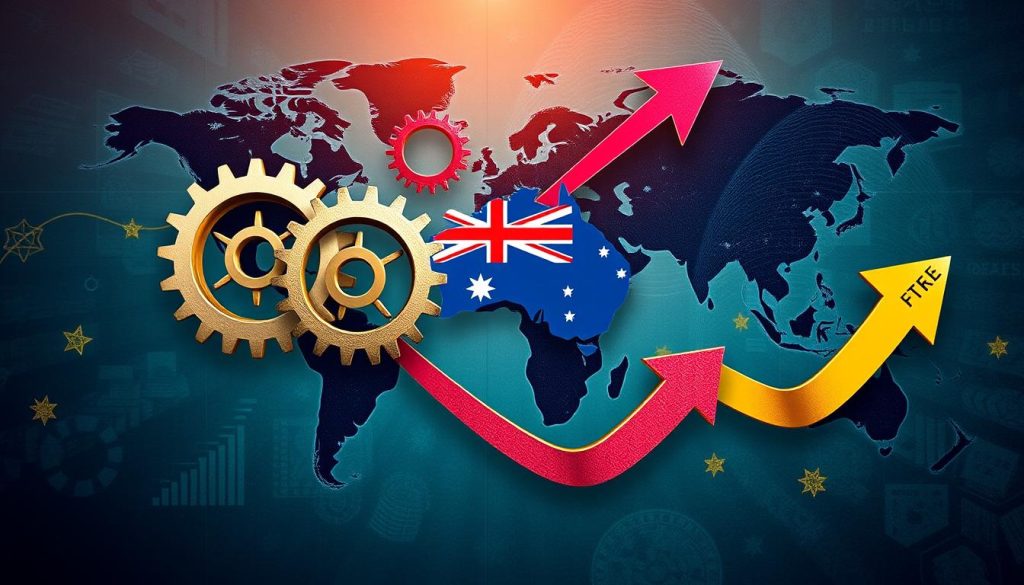
Starting a successful trade journey in imports and exports needs a deep understanding of how to enter markets. Companies can choose direct exporting for more control or partnerships for better distribution and local insights.
Market research is key to picking the right path. Knowing what customers want in target markets helps make smart choices. This knowledge helps businesses match their products with local needs, making them more competitive.
Managing risks is vital in any good import and export plan. Spotting possible problems like changing tariffs or supply chain issues helps businesses prepare. Using insurance or finding new suppliers can help deal with these risks.
Good business planning is crucial. A solid plan sets out goals, financial plans, and marketing strategies. It helps navigate the complex world of international trade. This planning ensures resources are used well and businesses can adapt to market changes.
Case Studies: Successful Import and Export Businesses in Australia
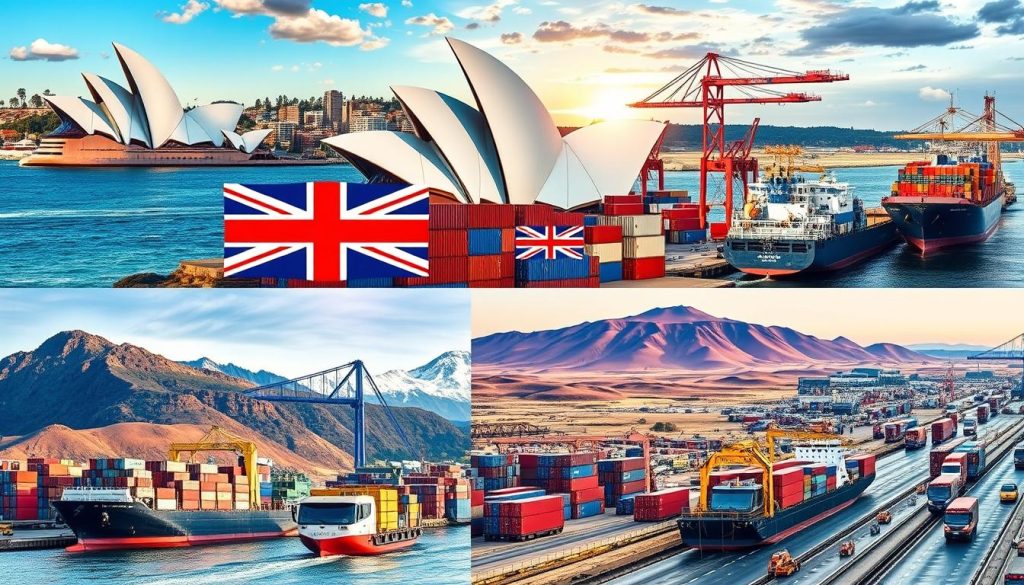
Australia’s import and export scene is filled with stories of businesses that have thrived. They’ve made big impacts in both local and global markets. These stories show how they used new ideas, smart strategies, and grew a lot. Learning from these leaders can teach us a lot about how to succeed.
Lessons Learned from Industry Leaders
Top import and export companies are known for being tough and flexible. They face challenges head-on, using lessons that help many businesses. Here are key things we can learn from them:
- Good risk management helps avoid problems in supply chains.
- Being able to change with market trends keeps you competitive.
- Using technology makes things run smoother and keeps customers happy.
- Strong partnerships open up new markets.
- Being green and ethical wins over customers worldwide.
Looking at successful Australian exporters, we see that using these strategies worked for them. By learning from these successes, new businesses can start strong.
Future Trends in Import and Export Business in Australia

The import and export business in Australia is changing fast. This is due to many factors that show how trade will evolve. As people want more eco-friendly products, companies are moving towards greener practices. This matches global trends that aim to reduce harm to the environment and support fair trade.
New markets are opening up for Australian businesses. They are looking into areas they haven’t explored before, seeing big growth chances. Experts predict that sectors like farming, tech, and green energy will be key in these markets. Businesses need to keep up and be quick to grab these chances.
- Shifts in consumer preferences towards sustainable goods.
- Integration of technology in supply chains for improved efficiency.
- Enhanced focus on ethical trade practices.
Trade is also affected by global politics. How countries relate to each other will influence trade. Knowing this can help businesses face challenges and find good partners. By being proactive, Australian companies can stay ahead in the fast-changing world of global trade.
Resources and Support for New Businesses
Starting a business in the import and export sector can be rewarding but challenging. Luckily, there are many resources to help new businesses. Government support, including grants and funding, is available for those looking to grow globally.
Trade information is key to understanding markets and what customers want. Organisations like Austrade offer insights and tools to find opportunities abroad. Joining trade associations and export councils also helps by providing advice, networking, and mentorship.
Using available support is vital for new businesses going global. With government help and industry networks, they can succeed in the import and export world. This support can make operations smoother and increase chances of long-term success.
















